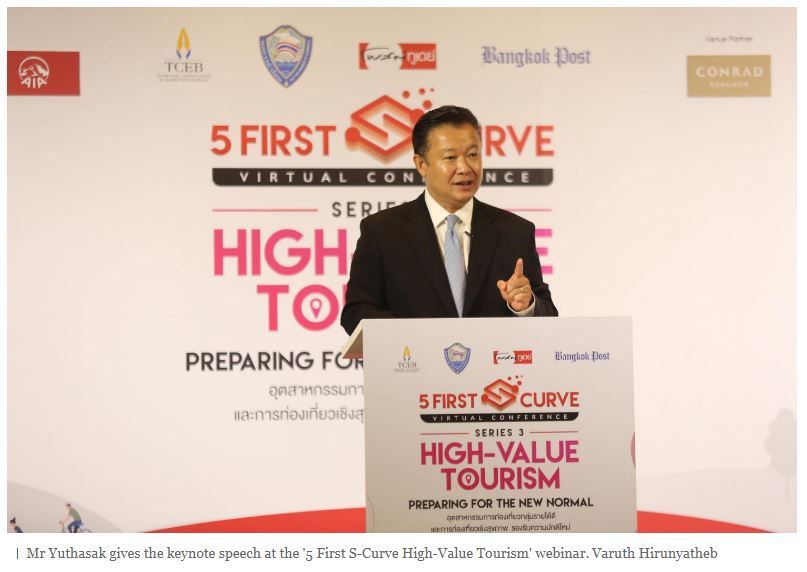Thailand – TAT: Health, safety key to revival
Tourism needs to adopt lessons learned from the outbreak to enhance safety and health competitiveness as the industry’s priorities shift from volume to value, says the Tourism Authority of Thailand.
TAT governor Yuthasak Supasorn said effective risk management will be the key to overcoming challenges next year if the world is hit by a second wave of the coronavirus pandemic.
He said most tourism-related operators are on the brink of bankruptcy, especially airlines, while local residents have developed a negative attitude towards foreigners.
Under the TAT’s best-case scenario for 2021 — with a vaccine available at the start of the year and international tourists returning in the second quarter without triggering a second wave — Thailand would welcome 20.5 million tourists, down 48% from 2019, and generating 980 billion baht, down 49%.
Of that number, 16.7 million would come from Asia-Pacific and 3.8 million from Europe, the Americas, the Middle East and Africa.
Local tourists would make 99.1 million trips, up 10% from 2020, and contribute 570 billion baht, up 15%.
Speaking on Thursday at a webinar on “5 First S-Curve High-Value Tourism” organised by the Thailand Convention and Exhibition Bureau, the Thai Chamber of Commerce, Post Today and the Bangkok Post, Mr Yuthasak said provinces within driving distance of Bangkok will see a faster recovery.
He identified three groups making up a large part of local tourism: Thai people (some 80% from Bangkok), expats, and employees in the governmental and commercial sectors.
The first group that will be ready to travel consists of those who are unconcerned about illness and have high purchasing power.
“Senior tourists used to be the target group for our industry,” Mr Yuthasak said. “But with this new-normal model, high-value tourists with good health will be our first priority.”
The agency aims to use the opportunity from the pandemic to pursue tourism in a safer and more sustainable manner to improve Thailand’s standing in the World Economic Forum’s Travel and Tourism Competitiveness Index.
At present, Thailand ranks 88th out of 140 countries in health and hygiene and 111th in safety and security.
Krit Patarapal, managing director of PK Exhibition, the organiser of the Thai Tiew Thai tourism fair, said the exhibition market has always been at the forefront when the country had to face crises head-on.
In the past, the sector was bruised by political unrest, natural disasters and outbreaks that required the company to prepare for crisis management, be ready to communicate and stay connected with customers for better understanding.
Mr Krit said event sizes and costs must be slashed to fit with limited demand and physical distancing rules, while operators have to learn more useful skills to meet the new standards.
He said business-to-business international exhibitions declined in the first half of 2020 amid virus fears and border closures in most parts of the world.
In the second half of the year, operators can host more domestic consumer fairs but must comply with the Centre for Covid-19 Situation Administration’s guidelines.
Mr Krit said just 10% of exhibition operators in the industry will make it through to the other side of the crisis. Some 50% of about 10,000 operators have already quit the business.
As for the readiness and initiatives of the health industry in navigating the pandemic, Thailand’s healthcare model will also shift from volume to value, said Napas Paorohitya, chief marketing officer of Bumrungrad Hospital.
To attract more Thais, Bumrungrad is offering a 40% discount on room rates and a 20% discount on medicine prices for citizens.
Buranat Limchitti, senior vice-president for international marketing at Dusit Medical Services, said his group has a plan to register its 17 hospitals as alternative hospital quarantine sites for returnees.
Source: https://www.bangkokpost.com/business/1975859/tat-health-safety-key-to-revival


 English
English




